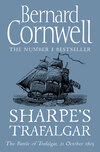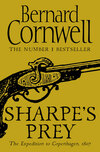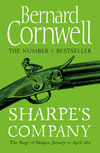Kitabı oku: «The Sharpe Series», sayfa 6
Sharpe went below to eat breakfast and when he came back to the deck, properly dressed, Cromwell had gone to the poop from where he was watching north for fear that the Company frigate might appear to order him back to the convoy, but neither Cromwell, nor the men aloft, saw any sign of the other ships. It appeared that Cromwell had escaped the convoy and could now let Calliope show her speed. And show it she did, for every sail that had been handed at nightfall was now back on the yards, stretching to the wet wind, and the Calliope seemed to churn the sea to cream as she raced southwards.
The wind moderated during the day and the clouds scudded themselves ragged so that by nightfall the sky was again clear and the sea was blue green instead of grey. There was an air of ebullience on board, as though by freeing itself of the convoy the Calliope had brightened everyone’s life. There was the sound of laughter in steerage, and cheers when Tufnell rigged wind scoops to air out the foetid decks. Passengers joined the seamen in dances below the forecastle as the sun sank in a blaze of orange and gold.
Pohlmann brought Sharpe a cigar before supper. ‘I won’t invite you to eat with us tonight,’ he said. ‘Joshua Fazackerly is donating the wine, which means he will feel entitled to bore us all with his legal recollections. It will likely prove a tedious meal.’ He paused, blowing a plume of smoke towards the mainsail. ‘You know why I liked the Mahrattas? There were no lawyers among them.’
‘No law, either,’ Sharpe said.
Pohlmann gave him a sideways glance. ‘True. But I like corrupt societies, Richard. In a corrupt society the biggest rogue wins.’
‘So why go home?’
‘Europe is being corrupted,’ Pohlmann said. ‘The French talk loudly of law and reason, but beneath the talk there is nothing but greed. I understand greed, Richard.’
‘So where will you live?’ Sharpe asked. ‘London, Hanover or France?’
‘Maybe in Italy? Maybe Spain? No, not Spain. I could not stomach the priests. Maybe I shall go to America? They say rogues do well there.’
‘Or perhaps you’ll live in France?’
‘Why not? I have no quarrel with France.’
‘You will if the Revenant finds us.’
‘The Revenant?’ Pohlmann asked innocently.
‘French warship,’ Sharpe said.
Pohlmann laughed. ‘It would be like, how do you say? Finding a needle in a haystack? Although I have always thought it would be easy to find a needle in a haystack. Simply take a girl onto the stack and make love, and you could be quite certain the needle will find her bum. Have you ever made love on a haystack?’
‘No.’
‘I don’t recommend it. It is like those beds the Indian magicians sleep on. But if you do, Richard, make sure you are the one on top.’
Sharpe gazed out across the darkening ocean. There were no whitecaps any more, just an endless vista of slow-heaving waves. ‘How well do you know Cromwell?’ He blurted the question out, torn between a reluctance to raise the German’s suspicions and a desire not to believe in those suspicions at all.
Pohlmann gave Sharpe a glance full of curiosity and not a little hostility. ‘I scarcely know the man,’ he answered stiffly. ‘I met him once or twice when he was ashore in Bombay, because it seemed sensible if we were to get decent accommodation, but otherwise I know him about as well as you do. Why do you ask?’
‘I was wondering if you knew him well enough to find out why he left the convoy?’
Pohlmann laughed, his suspicions allayed by Sharpe’s explanation. ‘I don’t think I know him that well, but Mister Tufnell tells me we are to sail to the east of Madagascar while the convoy goes to the west. We shall make faster time, he reckons, and be home at least two weeks ahead of the other ships. And that will increase the value of the cargo in which the captain has a considerable interest.’ Pohlmann drew on the cigar. ‘You disapprove of his initiative?’
‘There’s safety in numbers,’ Sharpe said mildly.
‘There’s safety in speed, too. Tufnell says we should make at least ninety miles a day now.’ The German threw the remains of his cigar overboard. ‘I must change for supper.’
There was something wrong, Sharpe reckoned, but he could not place it. If Lady Grace was right, then Pohlmann and the captain talked frequently, but Pohlmann claimed he scarcely knew Cromwell, and Sharpe was inclined to believe her ladyship, though for the life of him he could not see how it affected anyone other than Pohlmann and Cromwell.
Two days later land was sighted far to the west. The shout from the masthead brought a rush of passengers to the starboard rail, though no one could see the land unless they were willing to climb into the high rigging, but a belt of thick cloud on the horizon showed where the distant coast lay. ‘Cape East on Madagascar,’ Lieutenant Tufnell announced, and all day the passengers stared at the cloud as though it portended something significant. The cloud was gone the following day, though Tufnell told Sharpe they were still following the Madagascar coast which now lay well beyond the horizon. ‘The next landfall will be the African shore,’ Tufnell said, ‘and there we’ll find a quick current to carry us round to Cape Town.’
The two men spoke on the darkened quarterdeck. It was well past midnight on the second day since the sighting of Cape East and the third night in succession that Sharpe had gone in the small hours to the quarterdeck in hope that Lady Grace would be on the poop. He needed to ask permission to be on the quarterdeck, but the watch officer had welcomed his company every night, unaware why Sharpe wanted to be there. The Lady Grace had not appeared on either of the first two nights, but as Sharpe now stood beside the lieutenant he heard the creak of a door and the sound of soft shoes climbing the stairs to the poop deck. Sharpe waited until the lieutenant went to talk with the helmsman, then he turned and went to the poop deck himself.
A thin sabre-curve of moon glistened on the sea and offered just enough light for Sharpe to see Lady Grace, swathed in a dark cloak, standing beside the stern lantern. She was alone, with no maid to chaperone her, and Sharpe joined her, standing a pace to her left with his hands, like hers, on the rail and he stared, like her, at the smooth, moon-silvered wake that slipped endlessly into the dark. The great mizzen driver sail loomed pale above them.
Neither spoke. She glanced at him when he joined her, but did not walk away. She just stared at the ocean.
‘Pohlmann,’ Sharpe said very quietly, for two panes of the cuddy’s skylight were open and he did not want to be overheard if anyone was below, ‘claims he does not know Captain Cromwell.’
‘Pohlmann?’ Lady Grace asked, frowning at Sharpe.
‘The Baron von Dornberg is no baron, my lady.’ Sharpe was breaking his word to Pohlmann, but he did not care, not when he was standing close enough to smell Lady Grace’s perfume. ‘His name is Anthony Pohlmann and he was once a sergeant in a Hanoverian regiment that was hired by the East India Company, but he deserted. He became a freelance soldier instead, and a very good one. He was the commander of the enemy army at Assaye.’
‘Their commander?’ She sounded surprised.
‘Yes, ma’am. He was the enemy general.’
She stared at the sea again. ‘Why have you protected him?’
‘I like him,’ Sharpe said. ‘I’ve always liked him. He once tried to make me an officer in the Mahratta army and I confess I was tempted. He said he’d make me rich.’
She smiled at that. ‘You want to be rich, Mister Sharpe?’
‘It’s better than being poor, milady.’
‘Yes,’ she said, ‘it is. So why are you telling me about Pohlmann now?’
‘Because he lied to me, ma’am.’
‘Lied to you?’
‘He told me he didn’t know the captain, and you told me that he does.’
She turned to him again. ‘Perhaps I lied to you?’
‘Did you?’
‘No.’ She glanced at the cuddy’s skylight, then walked to the far corner of the deck where a small signal cannon was lashed to the gunwale. She stood in the corner between the cannon and the taffrail and Sharpe, after a moment’s hesitation, joined her there. ‘I don’t like it,’ she said quietly.
‘Don’t like what, ma’am?’
‘That we’re sailing to the east of Madagascar. Why?’
Sharpe shrugged. ‘Pohlmann tells me we’re trying to race ahead of the convoy. Get to London first and bring the cargo to market.’
‘No one sails outside Madagascar,’ she said, ‘no one! We’re losing the Agulhas Current, which means we’ll make slower time. And by coming this way we go much closer to the Île-de-France.’
‘Mauritius?’ Sharpe asked.
She nodded. Mauritius, or the Île-de-France, was the enemy base in the Indian Ocean, an island fortress for raiders and warships with a main harbour protected by treacherous coral reefs and stone forts. ‘I told William all this,’ she said bitterly, ‘but he laughed at me. What would I know? Cromwell knows his business, he says, and I should just leave well alone.’ She fell silent and Sharpe was suddenly and awkwardly aware that she was crying. The realization astonished him, for one moment she had been as aloof as ever, and now she was weeping. She stood with her hands on the rail as the tears ran silently down her cheeks. ‘I hated India,’ she said after a while.
‘Why, milady?’
‘Everything dies in India,’ she said bitterly. ‘Both my dogs died, and then my son died.’
‘Oh, God, I’m sorry.’
She ignored his sympathy. ‘And I almost died. Fever, of course.’ She sniffed. ‘And there were times when I wished I would die.’
‘How old was your son?’
‘Three months,’ she said softly. ‘He was our first and he was so small and perfect, with little fingers and he was just beginning to smile. Just beginning to smile and then he rotted away. Everything rots in India. It turns black and it rots!’ She began to cry harder, her shoulders heaving with sobs and Sharpe simply turned her and drew her towards him and she went to him and wept onto his shoulder.
She calmed after a while. ‘I’m sorry,’ she whispered and half stepped away, but seemed content to let him keep his hands on her shoulders.
‘There’s no need to be sorry,’ Sharpe said.
Her head was lowered and Sharpe could smell her hair, but then she raised her face and looked at him. ‘Have you ever wanted to die, Mister Sharpe?’
He smiled at her. ‘I always reckoned that would be a terrible waste, my lady.’
She frowned at that answer, then, quite suddenly, she laughed and her face, for the first time since Sharpe had met her, was filled with life and he thought he had never seen, nor ever would see, a woman so lovely. So lovely that Sharpe leaned forward and kissed her. She pushed him away and he stepped back, mortified, readying incoherent apologies, but she was only extricating her arms that had been trapped between their bodies and once they were free she snaked them round his neck and pulled his face to hers and kissed him so fiercely that Sharpe tasted blood from her lip. She sighed, then placed her cheek against his. ‘Oh, God,’ she said softly, ‘I wanted you to do that since the moment I first saw you.’
Sharpe hid his astonishment. ‘I thought you hadn’t noticed me.’
‘Then you are a fool, Richard Sharpe.’
‘And you, my lady?’
She pulled her head back, leaving her arms about his neck. ‘Oh, I’m a fool. I know that. How old are you?’
‘Twenty-eight, milady, as near as I know.’
She smiled and he thought he had never seen a face so transformed by joy, then she leaned forward and kissed him lightly on the lips. ‘My name is Grace,’ she said quietly, ‘and why only as near as you know?’
‘I never knew my mother or father.’
‘Never? So who raised you?’
‘I wasn’t really raised, ma’am. Sorry. Grace.’ He blushed as he said it, for though he could imagine kissing her, and though he could imagine laying her on a bed, he could not accustom himself to using her name. ‘I was in a foundling home for a few years, one that were attached to a workhouse, and after that I fended for myself.’
‘I’m twenty-eight too,’ she said, ‘and I don’t think I’ve ever been happy. That’s why I’m a fool.’ Sharpe said nothing, but just stared at her in disbelief. She saw his incredulity and laughed. ‘It’s true, Richard.’
‘Why?’
There was a murmur of voices from the quarterdeck and a sudden glow of light as the compass in the lantern-lit binnacle was unshielded. Lady Grace stepped away from Sharpe and he from her, and both instinctively turned to stare at the sea. The binnacle light vanished. Lady Grace said nothing for a while and Sharpe wondered if she was regretting what had happened, but then she spoke softly. ‘You’re like a weed, Richard. You can grow anywhere. A big, strong weed and you’ve probably got thorns and stinging leaves. But I was like a rose in a garden: trained and cut back and pampered, but not allowed to grow anywhere except where the gardener wanted me.’ She shrugged. ‘I’m not seeking your pity, Richard. You should never waste pity on the privileged. I’m just talking to find out why I’m here with you.’
‘Why are you?’
‘Because I’m lonely,’ she answered firmly, ‘and unhappy and because you intrigue me.’ She reached out and touched a very gentle finger to the scar on his right cheek. ‘You’re a horribly good-looking man, Richard Sharpe, but if I met you in a London street I’d be very frightened of your face.’
‘Bad and dangerous,’ Sharpe said, ‘that’s me.’
‘And I’m here,’ Lady Grace went on, ‘because there is a joy in doing things we know we should not do. What Captain Cromwell calls our baser instincts, I suppose, and I suppose it will end in tears, but that does not preclude the joy.’ She frowned at him. ‘You look very cruel sometimes. Are you cruel?’
‘No,’ Sharpe said. ‘Perhaps to the King’s enemies. Perhaps to my enemies, but only if they’re as strong as I am. I’m a soldier, not a bully.’
She touched the scar again. ‘Richard Sharpe, my fearless soldier.’
‘I was terrified of you,’ Sharpe admitted. ‘From the moment I saw you.’
‘Terrified?’ She seemed genuinely puzzled. ‘I thought you despised me. You looked at me so grimly.’
‘I never said I didn’t despise you,’ Sharpe said in mock seriousness, ‘but from the moment I saw you I wanted to be with you.’
She laughed. ‘You can be with me here,’ she said, ‘but only on fine nights. I come here when I can’t sleep. William sleeps in the stern cabin,’ she explained, ‘and I sleep on the sofa in the day cabin. My maid uses a truckle bed there.’
‘You don’t sleep with him?’ Sharpe dared to ask.
‘I have to go to bed with him,’ she admitted, ‘but he takes laudanum every night because he insists he cannot sleep. He takes too much and he sleeps like a hog, so when he’s asleep I go to the day cabin.’ She shuddered. ‘And the drug makes him costive, which makes him even more bad-tempered.’
‘I have a cabin,’ Sharpe said.
She looked at him, unsmiling, and Sharpe feared he had offended her, but then she smiled. ‘To yourself?’
He nodded. ‘You’ll like it. It’s seven foot by six with walls of damp wood and clammy canvas.’
‘And you swing in your lonely hammock there?’ she asked, still smiling.
‘Hammock be blowed,’ Sharpe said, ‘I’ve a proper hanging cot with a damp mattress.’
She sighed. ‘And not six months ago a man offered me a palace with walls of carved ivory, a garden of fountains, and a pavilion with a bed of gold. He was a prince, and I must say he was very delicate about it.’
‘And were you?’ Sharpe asked, suddenly jealous of the man. ‘Were you delicate?’
‘I froze him.’
‘You’re good at that.’
‘And in the morning,’ she said, ‘I will have to be good at it again.’
‘Yes, my lady, you will.’
She smiled, acknowledging that he understood the necessary deception. ‘But it won’t be light,’ she said, ‘for another three hours.’
‘Four, more like.’
‘And I’ve been wanting to explore the ship,’ she said. ‘All I ever see is the roundhouse, the cuddy and the poop deck.’
He took her hand. ‘It’ll be pitch black below.’
‘I think that would probably help,’ she said gravely. She took her hand from his. ‘You go first,’ she said, ‘and I’ll follow. I’ll meet you on the main deck.’
And so he waited below the break of the quarterdeck and she did follow and he led her below and there they forgot their suspicions of Pohlmann and Cromwell.
Who, most probably, Sharpe thought when the dawn came and he lay astonished and alone again in his bed, had been playing backgammon. He closed his eyes, amazed at his happiness and praying that this voyage could last for ever.
CHAPTER FOUR

Two mornings later a sail was sighted, the first since the Calliope had left the convoy. It was dawn and the sky above unseen Madagascar was still dark when a topman saw the first sunlight reflect from a distant sail off the starboard bow. Captain Cromwell, summoned from his cabin by Lieutenant Tufnell, appeared agitated. He was wearing a flannel nightgown and his long hair was twisted into a bun at the nape of his neck. He stared at the strange ship’s sails through an ancient telescope. ‘It ain’t a native ship,’ Sharpe heard him say. ‘They’re proper topsails. Christian canvas, that.’ Cromwell ordered the main-deck guns to be unlashed. Powder was brought up from the magazines while Cromwell changed into his usual uniform. Tufnell went to the mainmast crosstrees equipped with a telescope. He stared for a long time, then shouted that he thought the distant vessel was a whaler. Cromwell seemed relieved, but left the powder charges on deck just in case the strange ship proved to be a privateer.
It was the best part of an hour before the distant ship could be seen from the Calliope’s deck and its presence brought the passengers on deck to stare at the stranger. Like the glimpse of land, this was a break in the journey’s tedium and Sharpe gazed with the rest, though he had an advantage over most of the passengers, for he possessed a telescope. The instrument was a marvel, a beautiful spyglass made by Matthew Berge of London and inscribed with the date of the battle of Assaye. Sir Arthur Wellesley had given the telescope to Sharpe, with his thanks engraved above the date, though he had been his usual distant and diffident self as he handed the glass over. ‘I would not have you think I was unmindful of the service you did me,’ the general had said awkwardly.
‘I was just glad to be there, sir,’ Sharpe had answered just as awkwardly.
Sir Arthur had forced himself to say something more. ‘Remember, Mister Sharpe, that an officer’s eyes are more valuable than his sword.’
‘I’ll remember that, sir,’ Sharpe said, reflecting that the general would have been dead without Sharpe’s sabre. Still, he supposed the advice was good. ‘And thank you, sir,’ Sharpe had said and remembered being obscurely disappointed with the telescope. He had reckoned that a good sword would have been a better reward for saving the general’s life.
Sir Arthur had frowned, but Campbell, one of his aides, had tried to be friendly. ‘So you’re off to join the Rifles, Sharpe?’
‘I am, sir.’
Sir Arthur had cut the conversation short. ‘You’ll be happy there, I’m sure. Thank you, Mister Sharpe. Good day to you.’
And thus Sharpe had become the ungrateful possessor of a telescope that would have been the envy of richer men. He trained it now on the strange ship, which, to his untutored eye, looked a good deal smaller than the Calliope. She was certainly no warship, but appeared to be a small merchantman.
‘She’s a Jonathon!’ Tufnell called from aloft, and Sharpe edged the glass leftwards and saw a faded ensign flying at the far ship’s stern. The flag looked very like the red-and-white-striped banner of the East India Company, but then the wind lifted it and he saw the stars in its upper quadrant and realized she was an American.
Major Dalton had come down to the main deck and now stood beside Sharpe who politely offered the Scotsman the use of the telescope. The major stared at the American ship. ‘She’s carrying powder and shot to Mauritius,’ he said.
‘How do you know, sir?’
‘Because that’s what they do. No French merchantman dare sail in these waters, so the damned Americans supply Mauritius with weaponry. And they have the nerve to call themselves neutral! Still, I’ve no doubt they turn a fine profit, which is all that matters to them. This is a very fine glass, Sharpe!’
‘It was a gift, Major.’
‘A handsome one.’ Dalton handed the glass back and frowned. ‘You look tired, Sharpe.’
‘Not been sleeping that well, Major.’
‘I pray you’re not sickening. The Lady Grace is also looking very peaky. I do hope there isn’t ship fever on board. I recall a brigantine coming into Leith when I was a child and there can’t have been more then three men alive on her, and they were near death’s door. They couldn’t land, of course, poor things. They had to anchor off and let the sickness run its course, which left them all dead.’
The American, confident that the Calliope presented no threat, sailed close to the great Indiaman and the two ships inspected each other as they passed in mid ocean. The American ship was half the Calliope’s length and her main deck was crammed with the longboats that her crew used to stalk and kill whales. ‘Doubtless she’ll drop her cargo on Mauritius,’ Major Dalton observed, ‘then head for the Southern Ocean. A hard life, Sharpe.’
The American crew returned the Calliope’s waves, then she was past and the folk on board the Indiaman could read the whaler’s name and hailing port, which were painted in blue and gold on handsome stern boards. ‘The Jonah Coffin out of Nantucket,’ Dalton said. ‘What extraordinary names they do pick!’
‘Like Peculiar Cromwell?’
‘There is that!’ Dalton laughed. ‘But I can’t imagine our captain painting his name on his boat’s stern, can you? By the way, Sharpe, I’ve donated a pickled tongue for dinner.’
‘Generous of you, sir.’
‘And I owe you a recompense for all the help you’ve been to me,’ Dalton said, referring to his long conversations with Sharpe about the war against the Mahrattas which the major planned to write about in his retirement, ‘so why don’t you join us at noon? The captain’s agreed to let us eat on the quarterdeck!’ Dalton sounded excited, as if dining in the open air would prove a special treat.
‘I don’t want to intrude, Major.’
‘No intrusion, no intrusion! You shall be my guest. I’ve also donated some wine and you can help drink it. Red coat, I fear, Sharpe. Dinner might be a mere cold collation, but Peculiar rightly insists there are no shirtsleeves on the quarterdeck.’
Sharpe had an hour before the dinner was to be served and he went below to brush the red coat and, to his astonishment, found Malachi Braithwaite seated on his travelling chest. The secretary was becoming ever more morose as the voyage continued and now looked up at Sharpe with resentful eyes.
‘Lost your own quarters, Braithwaite?’ Sharpe asked brusquely.
‘I wanted to see you, Sharpe.’ The secretary seemed nervous, unable to meet Sharpe’s eyes.
‘You could have found me on deck,’ Sharpe said and waited, but Braithwaite said nothing, just watched as Sharpe draped the red coat over the edge of the hanging cot and began to brush it vigorously. ‘Well?’ Sharpe asked.
Braithwaite still hesitated. His right hand was fiddling with a loose thread hanging from the sleeve of his faded black coat, but he finally summoned the courage to look at Sharpe, opened his mouth to speak, then lost his courage and closed it again. Sharpe scrubbed at a patch of dirt and finally the secretary found his voice. ‘You entertain a woman at nights,’ he blurted out accusingly.
Sharpe laughed. ‘What if I do? Didn’t they teach you about women at Oxford?’
‘A particular woman,’ Braithwaite said in a tone so filled with resentment that he sounded like a spitting serpent.
Sharpe put the brush on top of his barrel of arrack and turned on the secretary. ‘If you’ve got something to say, Braithwaite, then bloody say it.’
The secretary reddened. The fingers of his right hand were now drumming on the edge of the chest, but he forced himself to continue the confrontation. ‘I know what you’re doing, Sharpe.’
‘You don’t know a bloody thing, Braithwaite.’
‘And if I inform his lordship, as I should, then you can be assured that you will have no career in His Majesty’s army.’ It had taken almost all Braithwaite’s courage to voice the threat, but he was encouraged by a rancour that was eating him like a tapeworm. ‘You’ll have no career, Sharpe, none!’
Sharpe’s face betrayed no emotion as he stared at the secretary, but he was privately appalled that Braithwaite had discovered his secret. Lady Grace had been in this squalid cabin for two nights running, coming long after dark and leaving well before dawn, and Sharpe had thought no one had noticed. They had both believed they were being discreet, but Braithwaite had seen and now he was bitter with envy. Sharpe picked up the brush. ‘Is that all you’ve got to say?’
‘And I’ll ruin her too,’ Braithwaite hissed, then started violently back as Sharpe threw down the brush and turned on him. ‘And I know you deposited valuables with the captain!’ the secretary went on hurriedly, holding up both hands as if to ward off a blow.
Sharpe hesitated. ‘How do you know that?’
‘Everyone knows. It’s a ship, Sharpe. People talk.’
Sharpe looked into the secretary’s shifty eyes. ‘Go on,’ he said softly.
‘My silence can be purchased,’ Braithwaite said defiantly.
Sharpe nodded as though he were considering the bargain. ‘I’ll tell you how I’ll buy your silence, Braithwaite, a silence, by the way, about nothing because I don’t know what you’re talking about. I reckon Oxford addled your brain, but let’s suppose, just for a minute, that I think I know what you’re suggesting. Shall we agree to that?’
Braithwaite nodded cautiously.
‘And a ship is a very small place, Braithwaite,’ Sharpe said, seating himself beside the gangly secretary, ‘and you can’t escape me on board this ship. And that means that if you open your sordid mouth to tell anyone anything, if you say even one bloody word, then I’ll kill you.’
‘You don’t understand …’
‘I do understand,’ Sharpe interrupted, ‘so shut your mouth. In India, Braithwaite, there are men called jettis who kill by wringing their victims’ necks like chickens.’ Sharpe put his hands on Braithwaite’s head and began to twist it. ‘They twist it all the bloody way round, Braithwaite.’
‘No!’ the secretary gasped. He fumbled at Sharpe’s hands with his own, but he lacked the strength to free himself.
‘They twist it till their victim’s eyes are staring out over his arse and his neck gives way with a crack.’
‘No!’ Braithwaite could barely speak, for his neck was being twisted hard round.
‘It’s not really a crack,’ Sharpe went on in a conversational tone, ‘more a kind of grating creak, and I’ve often wondered if I could do it myself. It’s not that I’m afraid of killing, Braithwaite. I wouldn’t have you think that. I’ve killed men with guns, with swords, with knives and with my bare hands. I’ve killed more men, Braithwaite, than you can imagine in your worst nightmare, but I’ve never wrung a man’s neck till it creaked. But I’ll start with you. If you do anything to hurt me, or anything to hurt any lady I know, then I’ll twist your head like a cork in a bloody bottle, and it’ll hurt. My God, it’ll hurt.’ Sharpe gave the secretary’s neck a sudden jerk. ‘It’ll hurt more than you know, and I promise you that it will happen if you say so much as one single bloody word. You’ll be dead, Braithwaite, and I won’t give a rat’s droppings about doing it. It’ll be a real pleasure.’ He gave the secretary’s neck a last twist, then let go.
Braithwaite gasped for breath, massaging his throat. He gave Sharpe a scared glance, then tried to stand, but Sharpe hauled him back onto the chest. ‘You’re going to make me a promise, Braithwaite,’ Sharpe said.
‘Anything!’ All the fight had gone from the man now.
‘You’ll say nothing to anybody. And I’ll know if you do, I’ll know, and I’ll find you, Braithwaite. I’ll find you and I’ll wring your scrawny neck like a chicken.’
‘I won’t say a word!’
‘Because your accusations are false, aren’t they?’
‘Yes.’ Braithwaite nodded eagerly. ‘Yes, they are.’
‘You’re having dreams, Braithwaite.’
‘I am, I am.’
‘Then go. And remember I’m a killer, Braithwaite. When you were at Oxford learning to be a bloody fool I was learning how to kill folk. And I learned well.’
Braithwaite fled and Sharpe stayed seated. Damn, he thought, damn and damn and damn again. He reckoned he had frightened the secretary into silence, but Sharpe was still scared. For if Braithwaite had found out, who else might discover their secret? Not that it mattered for Sharpe, but it mattered mightily to Lady Grace. She had a reputation to lose. ‘You’re playing with fire, you bloody fool,’ he told himself, then retrieved his brush and finished cleaning his coat.
Pohlmann seemed surprised that Sharpe should be a guest at dinner, but he greeted him effusively and shouted at the steward to fetch another chair onto the quarterdeck. A trestle table had been placed forward of the Calliope’s big wheel, spread with white linen and set with silverware. ‘I was going to invite you myself,’ Pohlmann told Sharpe, ‘but in the excitement of seeing the Jonathon I quite forgot.’
There was no precedence at this table, for Captain Cromwell was not dining with his passengers, but Lord William made sure he took the table’s head, then cordially invited the baron to sit beside him. ‘As you know, my dear baron, I am compiling a report on the future policy of His Majesty’s government towards India and I would value your opinion on the remaining Mahratta states.’
Ücretsiz ön izlemeyi tamamladınız.















